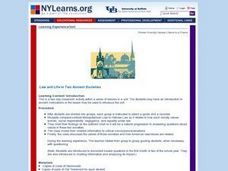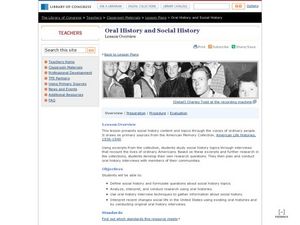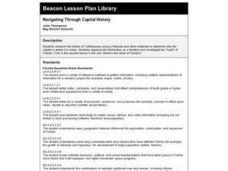Benjamin Franklin Tercentenary
Ingenious: Franklin Assembles a Scientific Community
Few Americans have heard of the burgeoning scientific community known as the America Philosophical society, started by none other than Benjamin Franklin. With inquiry, research, and discussion, high schoolers come to understand their...
DC Vote
One Kid, One Vote
Learn about why the citizens of Washington, D.C. feel unrepresented in Congress with an article about D.C voting rights. Individuals read about the movement toward congressional representation in Washington, D.C., before answering...
Curated OER
A Multimedia Science Project: Minorities and Women in Science
Eighth graders create a multimedia presenttation written presentation, and oral presentation detailing the contributions of three minority or female scientists throughout history.
Curated OER
Exploring Women's History
Students read and analyze Jessie Benton Fremont's travelogue of her trip out west in 1849 to identify the gender roles, social attitudes and class distinctions of the time. They then adapt the the travelogue into a film script.
Curated OER
Cult of Domesticity
Eleventh graders explore the role of women in 1800's America. In this women's history lesson, 11th graders examine excerpts of "An Essay on Slavery and Abolitionism with Reference to the Duty of American Females," and "Letters to...
Curated OER
Revolutionary Women of South Carolina
Students examine multiple primary sources. In this revolutionary war lesson, students read case studies regarding women from South Carolina. Students will compare the different roles women played during the Revolutionary War. Students...
Curated OER
Wives and Mothers in WWII
Eighth graders explore the effect of World War II from a financial standpoint. In this World History lesson, 8th graders review World War II through teacher lecture, reading and viewing pictures and cartoons, then discuss the hardships...
Scholastic
The Flight of Amelia Earhart Teaching Guide
Amelia Earhart's accomplishments and strength of character extend beyond her status as one of the first female aviators in America. Elementary and middle schoolers learn about Earhart's early life and the historical context surrounding...
National Endowment for the Humanities
Kate Chopin's "The Awakening": No Choice But Under?
The first in a series of three resources designed to accompany a reading of Kate Chopin's The Awakening provides readers with background information about Chopin, Creole culture, literary realism, and women's suffrage.
Curated OER
Pizza Biography
A biography writing lesson with a tasty twist! Kids create a "visual biography" in which each pizza slice represents a paragraph, and toppings represent supporting details. They learn research techniques, note-taking skills, and how to...
Curated OER
Susan B. Anthony Day
The history of women's suffrage and Susan B. Anthony are examined in this social studies instructional activity. Third and fourth graders participate in a simulation of a vote, develop slogans for women's suffrage, complete a KWL chart,...
Curated OER
Cheerful Hearts and Willing Feet
Students explore characterization in Little Women. In this literature lesson, students participate in written analysis and research in order to explore Alcott's characterization in the novel.
Curated OER
Law and Life in Two Ancient Societies
Students work in groups and compare/contrast Mesopotamian Law to Hebrew Law. They chart their findings on a chart to show a natural progression to answering questions about values in these two societies.
Education Oasis
Creative Writing Unit: Analyzing, Interpreting, Discussing and Writing Various Genres of African-American Literature
A six-week unit takes high schoolers through various works of African-American literature, including poems, plays, and short stories. The lesson plan format includes a week-by-week description of activities, goals, materials, and...
Curated OER
What Women Want
Students investigate the role of women in leadership in history. They conduct research in order to find the real story. The lesson stresses the fact that women are not well known in history. There is a variety of activities in this unit...
Curated OER
WACS, WAVES< and SPARS: Women during World War II
Eleventh graders conduct a class discussion on the historical background information of women during World War II. In this American History lesson, 11th graders evaluate what motivated women during this time. Students create a...
Curated OER
Women in Islam
Students examine the beliefs and practices of Islam. In this religion activity students make comparisons on women's rights throughout history.
National Woman's History Museum
Sally Hemings: Raising a Family Amidst the Brutality of Slavery
Pupils may know about early American figures such as Phyllis Wheatley and Abigail Adams, but what about Sally Hemings? Sally Hemings was the mother of Thomas Jefferson's children, but she is often left in the shadows of history....
NYC Department of Records
Citizenship and Elections: The Importance of a Ballot
Approximately 58 prcent of those eligible voted in the 2016 US Presidential election. In an attempt to impress upon learners the importance of voting and voting rights, class members examine primary source documents related to the...
Library of Congress
Suffragists and Their Tactics
Students research the fight for voting rights. In this women's history lesson, students analyze primary sources to develop an understanding of the strategies employed by the suffragists to gain voting rights.
Library of Congress
Oral History and Social History
Students examine the Great Depression. In this oral and social histories instructional activity, students analyze primary sources to develop an understanding of the America in the 1930's.
Curated OER
Navigating Through Capital History
Fourth graders research the history of Tallahassee using a Website and other materials to determine why the capital is where it is today. They organize the information on a timeline and investigate the "heart" of Florida.
PBS
Universal Declaration of Human Rights
What rights are guaranteed to students? Do they align with the Universal Declaration of Human Rights, which was approved by the United Nations in 1948? Middle and high schoolers present persuasive arguments about the rights they believe...

























